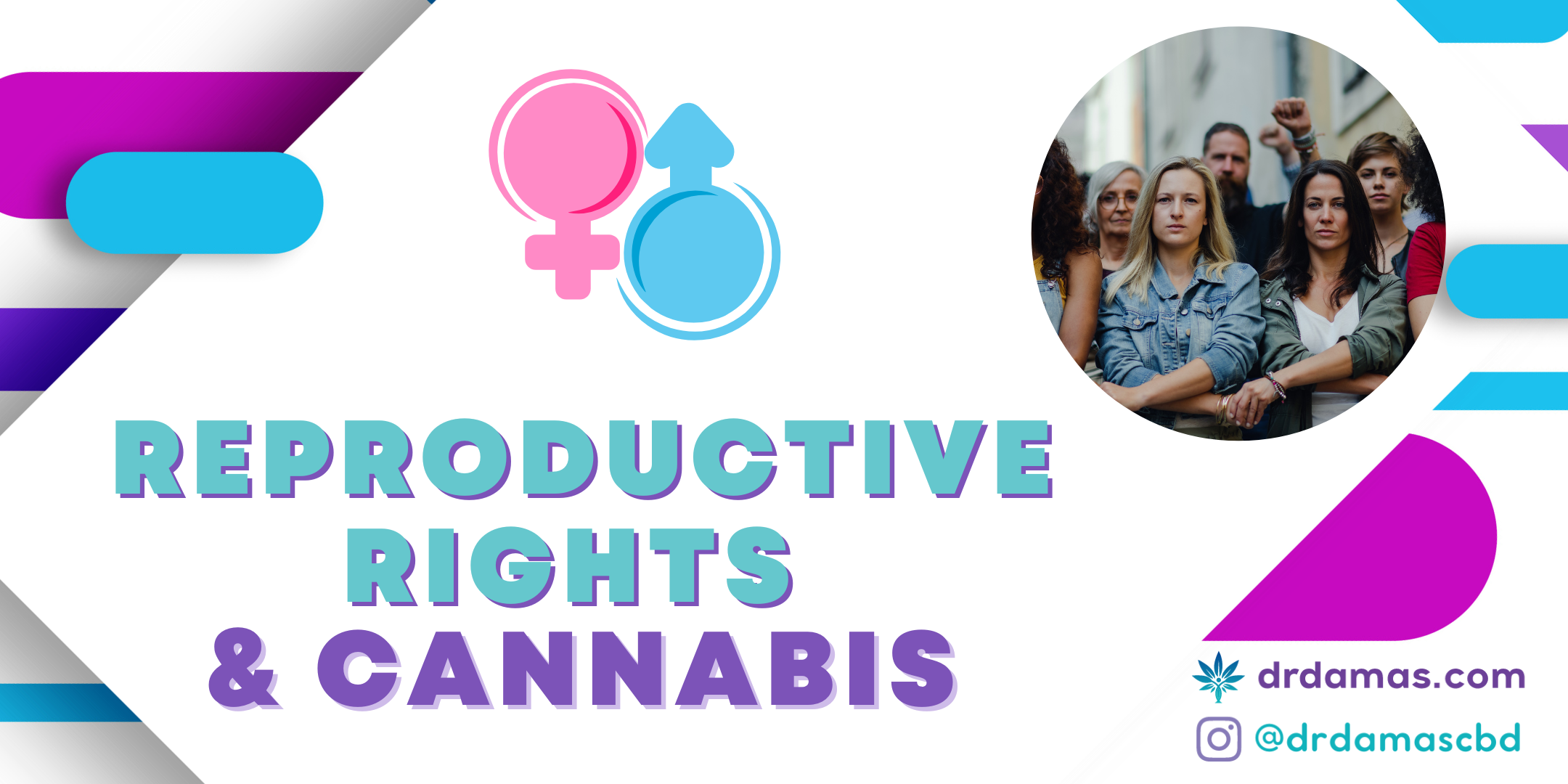Cannabis and Reproductive Rights: Let's Talk About it
I had one of the heaviest conversations with a patient recently. She had to make the decision to terminate a pregnancy because of a very serious fetal anomaly. Living in Florida, she was unable to obtain the necessary procedure here and therefore had to fly to colorado. When I spoke to her, she expressed a variety of thoughts and emotions from grief to anger to sadness and everything in between. On top of all that, she was also in serious physical pain and wanted to make sure it was ok for her to start using cannabis again.
As I’ve mentioned in previous #flowertothepeople segments and posts, this election will impact our lives in many ways. For my personal and professional interests, cannabis legalization and reproductive rights happen to be two issues that intersect.
Women and CBD/Cannabis Use
The use of CBD and cannabis among women has seen a significant rise in recent years. According to a 2021 report by Brightfield Group, about 35% of women in the U.S. have used CBD products, with a notable increase in usage among women aged 25-44. The primary reasons cited for use include managing anxiety, pain relief, and improving sleep quality.
Industry trends show a growing market for CBD-infused products targeted specifically at women, including skincare, wellness, and reproductive health products. Additionally, women are increasingly turning to cannabis for its perceived benefits in alleviating symptoms of conditions like endometriosis and menstrual pain.
Pearls
A study by the Journal of Women’s Health found that 67% of women reported significant relief from anxiety after using CBD products.
The Brightfield Group's report also highlighted that the female market for CBD is expected to grow by 31% annually through 2025.
Historical Use of CBD and Cannabis During Pregnancy
Historically, the use of cannabis during pregnancy has been both controversial and varied across cultures. In ancient times, cannabis was sometimes used as a remedy for labor pains and morning sickness. However, modern research presents a more complex picture. A study published in the Journal of the American Medical Association in 2020 found that approximately 7% of pregnant women in the U.S. reported using cannabis, with higher rates among those experiencing severe nausea. Despite these reported uses, the American College of Obstetricians and Gynecologists advises against cannabis use during pregnancy due to potential risks to fetal development. Recent studies indicate possible links between prenatal cannabis exposure and lower birth weight, as well as developmental issues in children.
Pearls
Historical texts from ancient China and Egypt mention the use of cannabis for managing labor pain.
The Journal of the American Medical Association study indicated that cannabis use during pregnancy has increased by 25% in the last decade.
Legal Implications of CBD & Cannabis Use During Pregnancy
The legal framework surrounding the use of CBD and cannabis during pregnancy varies significantly by state. In Florida, medical cannabis is legal for individuals with qualifying conditions, but it remains illegal for recreational use. Pregnant women are advised to exercise caution due to potential legal and medical implications. Florida law mandates that healthcare providers report any suspected prenatal drug exposure, which can lead to investigations by child protective services.
The use of CBD, while federally legal if it contains less than 0.3% THC, is still advised against by healthcare providers for pregnant women due to the lack of conclusive research on its safety. Florida's legal system emphasizes protecting the health and welfare of the child, making it crucial for pregnant women to consult healthcare professionals before using these substances.
Pearls
Florida law requires healthcare providers to report prenatal drug exposure, which can have legal repercussions for pregnant women.
Despite the legality of CBD, the FDA has not approved any CBD products specifically for use during pregnancy.
Abortion
Abortion, as we’re discussing here, is the medical termination of a pregnancy. It is a highly sensitive and controversial topic, with various factors influencing a woman's decision to undergo the procedure.
Abortion rates vary widely across different demographics. According to the research, in 2017 18.4% of pregnancies (excluding miscarriages) ended in abortion. Young women aged 20-24 accounted for 29% of all abortions, and women of color, including African American and Hispanic women, had higher abortion rates compared to white women. Additionally, women with lower socioeconomic status are more likely to seek abortions due to financial instability and lack of access to contraception
CBD and Cannabis for Post-Abortion Recovery
Post-abortion recovery, whether following a miscarriage or an intentional termination, can be physically and emotionally challenging. CBD and cannabis have been reported to help manage some of the associated symptoms. For instance, CBD is known for its anti-inflammatory and analgesic (pain relieving) properties, which can help alleviate cramping and pain following an abortion. Cannabis, particularly strains high in CBD, may also help reduce stress and anxiety, aiding in emotional recovery.
Marijuana Legalization Issues in the Upcoming Election
The upcoming election is poised to be a significant one for marijuana legalization, both federally and statewide. At the federal level, there is growing bipartisan support for the legalization or decriminalization of marijuana, with bills such as the Marijuana Opportunity Reinvestment and Expungement (MORE) Act and the Cannabis Administration and Opportunity Act gaining traction. These bills aim to remove marijuana from the list of controlled substances, expunge certain marijuana-related convictions, and implement a regulatory framework for cannabis commerce.
In Florida, marijuana legalization is a hot-button issue. Florida voters will have the opportunity to vote on the Florida Marijuana Legalization Initiative/Amendment 3, which seeks to legalize the recreational use of marijuana for adults over the age of 21. This initiative, if passed, would allow individuals to possess, use, and cultivate marijuana within state-regulated limits. The push for legalization in Florida is supported by advocacy groups who argue that it could bring significant economic benefits and reduce the state's incarceration rates for non-violent drug offenses.
Intersection of Marijuana Legalization and Abortion Rights
The issues of marijuana legalization and decriminalization intersect with abortion rights in several important ways. Both movements are fundamentally about personal autonomy and the ability to make decisions about one's own body without government interference. Florida Amendment 3, Right to Abortion Initiative is on the Florida ballot this fall as well. Legalizing marijuana allows individuals to choose whether to use cannabis for medical or recreational purposes, while protecting abortion rights ensures that individuals have the freedom to make choices about their reproductive health.
In states like Florida, where both marijuana legalization and abortion rights are contentious issues, there is a significant overlap in the demographic groups advocating for these rights. Young people, people of color, and those with lower socioeconomic status often support both causes, viewing them as essential to advancing social justice and reducing inequalities. Additionally, both movements face similar challenges, such as opposition from conservative groups and the need for comprehensive public education campaigns to address misconceptions and inform the public about the benefits and safety of these choices.
Pearls
According to a Gallup poll, 68% of Americans support the legalization of marijuana, reflecting a significant shift in public opinion over the past decade.
Studies show that states with legalized marijuana have seen economic benefits such as increased tax revenue and job creation, as well as reductions in arrests for marijuana-related offenses.
Wrapping it All Up
I consider it a privilege that I am able to have the types of conversations with my patients that I do. It not only helps me grow as a physician but also creates opportunities to help others who may be experiencing similar tribulations. The decision to terminate a pregnancy is not something I as a man will ever have to wrestle with let alone live with, so I try to be supportive of a woman's right to choose more than anything else.
My personal reasons for cannabis advocacy provide a bit of synergy because part of the argument for both is autonomy. I believe you should have the right to decide what happens with your body and not be punished for making decisions that you feel are best for you. Remember to have open and honest discussions with your health care providers and that it’s ok to switch providers if you’re not happy with your care. As always, feel free to reach out if you have any questions- we’re always happy to help 🤗














